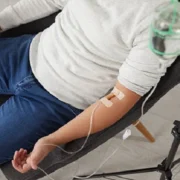Would you like more information about the relationship between bipolar illness and substance abuse?
Many people with bipolar illness struggle with drug or alcohol abuse, which is typically used as a coping mechanism for their symptoms. Although treatment can get more complicated with this link, knowing it is essential to getting appropriate care. We shall investigate in this paper how these two disorders interact and influence one another.
If you or someone you know is having this difficulty, keep reading to learn pertinent information and possible fixes.
Understanding Bipolar Disorder
The mental health condition known as bipolar disorder is characterized by severe mood swings. Deep lows, referred to as depression, and emotional highs, known as mania, are examples of these mood swings. During manic episodes, people could experience impulses or too much energy. During depressed episodes, people may feel hopeless, gloomy, or lose interest in regular activities.
These changes can influence a person’s thinking, actions, and capacity for functioning. Though the exact origin of bipolar illness is unknown, environmental elements and genetics certainly play a part. Usually, treatment to help control the symptoms consists of medication and therapy. Many people with bipolar illness can lead a joyful life with appropriate treatment.
What Is Substance Abuse?
Abuse of drugs or alcohol refers to the harmful use of either substance. Frequently, it results in emotional, psychological, and physical issues. Those who suffer from substance abuse may find it difficult to give up even with the negative consequences. They might turn to drugs or alcohol to help with emotional suffering or stress.
Substance abuse can lead to addiction, where the sufferer yearns for the drug over time. It can also encourage dangerous actions like driving drunk. Substance misuse compromises general well-being, relationships, and employment. Treatment usually calls for treatment, support groups, and occasionally medication.
How Bipolar Disorder and Addiction Are Linked
Addiction and bipolar illness often have a close relationship. To control mood fluctuations, persons with bipolar disease could turn to medicines or alcohol. Risky drug usage can result from the impulsive behavior during manic episodes. Conversely, during depressed times, people may turn to drugs as a means to escape from their emotions of gloom.
Using drugs or alcohol could aggravate bipolar symptoms and complicate therapy. Furthermore, aggravating the frequency and intensity of mood swings is substance addiction. This combo makes it more difficult for people to properly control both diseases. Treatment for both addiction and bipolar disease may require a comprehensive approach.
Mania and Increased Risk of Substance Abuse
In those with bipolar disease, mania can raise a person’s likelihood of developing substance dependence. Manic episodes can cause individuals to become overconfident and impulsive, potentially leading to dangerous actions. To control their strong feelings or to boost their high, they could turn to drugs or alcohol. Substance usage can exacerbate mania’s symptoms and interfere with therapy.
This combo sometimes results in a high risk of relapse in bipolar symptoms as well as in addiction. Mania’s disorderly character makes it more difficult for people to manage their behavior. Without appropriate support and treatment, substance misuse can escalate beyond control. Stability and rehabilitation depend on control of mania and substance use taken together.
Depression and Substance Use
Substance abuse and depression sometimes coexist closely. To dull their emotional suffering, those with depression could turn to medications or alcohol. While they offer some short-term alleviation, substances aggravate depression gradually. Addiction results from the cycle of utilizing drugs to cope.
A person who is depressed may feel less motivated to stop using. Substance addiction can interfere with depression therapies, including medication and counseling. It also raises one’s chance of engaging in other dangerous activities or self-abuse. Recovering from depression and drug usage calls for addressing both.
Common Substances Abused by Those With Bipolar
Those with bipolar illness could turn to many drugs. Among the most often used drugs is alcohol. Certain people turn to marijuana to control stress or mood changes. Mania episodes sometimes call for stimulants like cocaine or methamphetamine.
Another often abused prescription drug is one of the painkillers or anti-anxiety medications. People could turn to sedatives to get through their depressed moments. A risky approach to self-medication includes opioids and heroin. Substance misuse worsens bipolar illness therapy and increases the difficulty of recovery.
How Substance Abuse Affects Treatment
Effective treatment of bipolar illness can be more difficult when one suffers from substance abuse. Alcohol and drugs can interact with pharmaceuticals, therefore lowering their potency. Abuse of drugs can cause mental instability that results in regular mood swings. Furthermore, substance abuse can cause a person to overlook their treatment plan or skip therapy appointments.
Substance misuse plus bipolar illness confounds diagnosis and treatment. This may lead to an increased likelihood of engaging in harmful activities or self-harm. Successful recovery from both diseases depends on treating them simultaneously. Mental health treatment might not be as successful without tackling substance misuse.
Risk Factors for Co-occurring Disorders
Environmental and genetic elements abound as risk factors for co-occurring diseases. The risk rises if there is a family history of mental health problems or addiction. Furthermore, contributing to both disorders is trauma or abuse experienced in childhood. Stressful life circumstances, such as job loss or marital difficulties, can set off symptoms.
Those with bipolar illness are more likely to have problems with drugs or alcohol. Substance use can aggravate already-present mental health issues, starting a loop. Further risk factors are inadequate coping mechanisms and a lack of support networks. Early identification of these hazards will facilitate treatment and preventative measures.
Identifying Warning Signs of Substance Abuse
Early intervention depends on the identification of warning indicators of substance misuse. One indication is clearly rising drug or alcohol consumption. People could start to ignore obligations in relationships or at their jobs. Common changes in behavior are those of mood swings or secretiveness. Physical indicators could show up as poor hygiene or bloodshot eyes.
People could also start lying to disguise their drug usage or begin debt borrowing. Another red indicator is participating in dangerous activities like driving under intoxication. Early identification results in treatment and helps to avert more major repercussions.
Dual Diagnosis
A dual diagnosis involves having both a mental health issue and a drug misuse one. This combination might complicate treatment. Managing symptoms of two diseases at once might prove difficult for some. Substance use can either cover up or aggravate mental health problems.
Good treatment calls for treating both conditions simultaneously. One must have therapy aiming at both mental wellness and addiction. Support groups can also enable people to manage and grasp their difficulties. Those having a dual diagnosis can lead normal lives with appropriate treatment.
Therapies for Bipolar and Substance Abuse
Managing bipolar illness as well as drug usage depends on therapies. Cognitive-behavioral therapy (CBT) aids people in breaking negative thought patterns that support drug use. Dialectical behavior therapy (DBT) improves emotional control and reduces impulsive conduct. Integrated therapy strategies are most successful for persons suffering from bipolar illness and drug dependence.
These treatments mix techniques to treat problems with mental health as well as with addiction. Group therapy offers a helping setting where people may discuss their experiences. Family therapy can assist in understanding and encouragement of rehabilitation for loved ones. Frequent treatment sessions lower the likelihood of recurrence and help to build coping mechanisms.
Medications for Managing Both Conditions
Managing both bipolar illness and substance dependence depends on medications. Like lithium, mood stabilizers can help bipolar disorder’s mood swings be under control. Antidepressants, when used sparingly to treat depressed episodes, require careful monitoring. Methadone or buprenorphine can help people with drug misuse control their withdrawal symptoms.
Prescription antipsychotics can also assist with mania and psychotic symptoms. Finding the correct drug that treats both disorders without generating negative effects is vital. Appropriate treatment can help to preserve stability over time and lower the chance of withdrawal symptoms.
The Role of Support Systems in Recovery
Recovery from mental health as well as from drug addiction depends on support systems. Support groups, friends, and family all give consistency and encouragement. Under trying circumstances, they can provide emotional support. Good support systems enable people to remain driven and goal-oriented.
Recovery with NA (Narcotics Anonymous) is one example of how peer support can aid in overcoming addiction. A positive support network also holds people accountable, helping them stay on track. With the right support, recovery becomes more achievable.
Long-Term Management of Bipolar and Addiction
Managing bipolar illness and addiction over long terms calls for constant attention. Reducing cravings and balancing mood depend much on medication. Therapy addresses both disorders; examples of cognitive-behavioral therapy include tracking development calls for regular check-ins with a mental health expert.
One can get encouragement from a solid support system of friends and relatives. Maintaining excellent nutrition and consistent exercise helps one recuperate. Avoiding factors that lead to drug usage is essential. Long-term recovery is feasible with regular treatment and support.
Find Out More About Substance Abuse and Bipolar Disorder
Bipolar illness and substance misuse have a close relationship. Both disorders could complicate living. Substance addiction typically aggravates bipolar symptoms and complicates therapy.
Those with the correct assistance can control both bipolar illness and addiction. Medications, support, and therapy can all help. One should seek expert advice. With the correct support and treatment, recovery is achievable.
Caring Touch Home Health Makes a Difference in Patients’ Lives










Comments